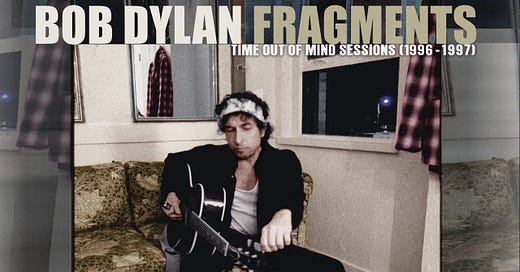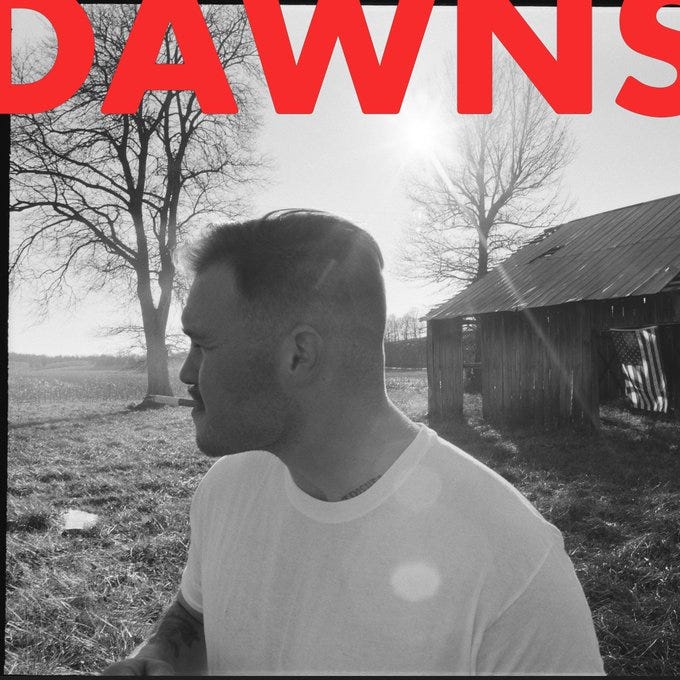Adventures in Listening, February 3 2023
Bob Dylan remixes a classic. Zach Bryan extends his hot streak. And: Ambient sax music!
Bob Dylan - Fragments: Time Out of Mind Sessions (1996-1997)
Bob Dylan has amassed many transgressions, real and imagined, across his storied career. There was the time he went electric. The time he got saved. The time he made a Christmas album. Among contemporary fans, it seems as though none of these infractions are quite so polarizing as his reliance on the Canadian producer Daniel Lanois to help midwife not one but two “comeback” albums, first 1989’s Oh Mercy and, when that one didn’t quite stick, 1997’s Time Out of Mind. Lanois is famous for his use of muted atmospherics— critics have long employed “gauze” as the operative metaphor to describe the muffling effect of Lanois’ sound— and depending on who you ask his involvement on Time Out of Mind either coaxed some career-best singing and songwriting from a wayward Dylan, ushering in the icon’s latter-day renaissance, or else ruined a perfectly good juke joint blues album by burying it in sonic sludge. Perhaps Dylan himself has come around to the second position: For the 17th installment of his ongoing “bootleg” series, he’s commissioned a whole new mix of Time out of Mind, the first time he’s ever allowed one of his albums to be retouched so significantly. Essentially, the new mix seeks to de-Lanois the album. It removes the gauze for something that’s ostensibly more visceral and direct, closer in sound to the roadhouse blues of “Love & Theft” or Modern Times.
Now, a confession. Oh Mercy was my entry into Dylan’s world, and as such will always occupy prime real estate in my heart. I tend to think of it as a strong, even faultless set of songs that are deliberately modest in scope, somewhat overwhelmed by Lanois’ ponderous atmosphere. But the sound of Time Out of Mind has always struck me as pretty close to perfect. The songs on that album, inspired by heartbreak and mortality, may use the language of country-blues, but they have just as much in common with the wisdom literature of the Hebrew Bible: In his anguish and despair Dylan often sounds like he’s living through Job or Ecclesiastes, and what is “Not Dark Yet” if not a Psalm of lament? This was never meant to be a party record, and Lanois’ subdued, holy-moment feel is appropriate. It’s as if the roar of the world is receding against the thunder of Dylan’s interior monologues, his dialogues with the Divine.
Having done my Lanois advocacy, here’s a second confession: At this point I may slightly prefer the 2022 mix. To be fair, the differences aren’t as pronounced as you might assume; the new version is a bit more crisp and clear, the rhythms have more kick, and you may notice some guitar parts that Lanois’ version scrubbed out. “Lovesick” starts the album still sounding very much like “Lovesick,” only now with punchier drums. By far the most consequential remake is “Dirt Road Blues,” which previously sounded like it was being piped in on a tinny radio but here locks into a visceral, hypnotic groove. (Here, for just a few minutes, Time Out of Mind actually is a party record.) Generally, the more rambunctious songs exhibit the greatest variation: Ballads like “Make You Feel My Love” open up a bit, but that’s not nearly as notable as the mighty thump you’ll hear on “Cold Irons Bound.”
It’s a pleasure to get a clearer sense of Dylan and his band making a ruckus together, but the big revelation for me is that the “holy-moment” feel I’ve prized for so long has a lot less to do with Lanois’ mix, and more to do with Dylan’s songwriting mode. The producer, so often credited with creating the mood for this album, was merely serving its songs all along. And even with more grit and more heft, these songs are still highly distinct from the material on, say, “Love & Theft,” as they occupy two totally different literary forms: One album is a psalter, the other a much looser assortment of comedies, tragedies, vaudeville routines, tall tales, and farces. One is David and Solomon; the other Mark Twain and Groucho Marx. All the remixing in the world won’t turn the former into the latter. Time Out of Mind is Time Out of Mind, and the new mix only deepens my appreciation for what’s always made the album profound.
The “bootleg” set also includes a number of alternate takes and castoffs, which Jayson Greene contextualizes very well in his Pitchfork review. There’s some okay material here, but the best of it (including the heartbreaking “Red River Shore” and a stripped-down “Mississippi”) was already included on The Bootleg Series Vol. 8: Tell Tale Signs, which is still one of the best entries in this ongoing series. The repetition of this material makes me wonder if perhaps this extensive chronicle of Dylan’s back pages may actually be nearing its conclusion. Time will tell.
Zach Bryan (ft. Maggie Rogers) - “Dawns”
Speaking of Bob Dylan, just last autumn the Bard released his book The Philosophy of Modern Song, appraising songwriters as varied as Elvis Costello and Bobby Bare, Marty Robbins and Nina Simone. You could probably write a philosophy of modern song drawing exclusively from the catalog of Zach Bryan, the Navy veteran turned impossibly-prolific, country-adjacent viral sensation. Last year’s supersized American Heartbreak seemed like it had songs for every occasion— an unwieldy 34 in total, ranging from riotous parodies to devastating character studies. Somehow, Bryan continues to release new material at a staggering pace— his distribution model is more rap than Americana, relying as much on loosies and rough-and-ready EPs as proper album rollouts— and the deluge of songs exhibits growing confidence and mastery. His latest single, a duet with Maggie Rogers, immediately ranks among the best things he’s ever done. It’s a breakup story told twice: Bryan’s verses are forlorn while Rogers exults in newfound freedom. (At NPR, Ann Powers has some thoughtful reflections on how the song plays with perspective, revealing how a relationship can be a refuge to one partner but prison to the other.) Bryan’s narrator also brings up the death of his mother, a wound that still sounds fresh; it’s a detail that seems off-topic at first but deepens the song’s very lived-in desperation. He’s awfully good at this.
Cole Pulice - Select Discography
Hat tip to Pitchfork writer Evan Minsker, whose recent profile introduced me to the “ambient saxophone multiverse” of Cole Pulice. I’m not entirely sure what I expected an “ambient saxophone multiverse” to sound like, but basically, Pulice blows clean, soothing melodies on his horn and then either augments or manipulates them using synths and computers. The music is peaceful enough to accompany reading, writing, or studying, but too playful to qualify as New Age; too weird to compete with Kenny G; too placid to be filed under jazz. Pulice has released a handful of bewitching little records over the past couple of years, many of them collaborations with other artists. Scry is the one that leans the most into digital whimsy, but the one I’ve played the most is To Live & Die in Time and Space, credited to Pulice and Lynn Avery. This is the one that really stretches out into expansive, time-stopping mood music, reveling in the commingling of analog and digital textures to create something warm, tactile, and serene. These records, along with the more synth-heavy and occasionally-disruptive Strawberry Roan, have proven valuable mind-cleansers and mood-levelers over the past week, and are likely to remain in rotation.






